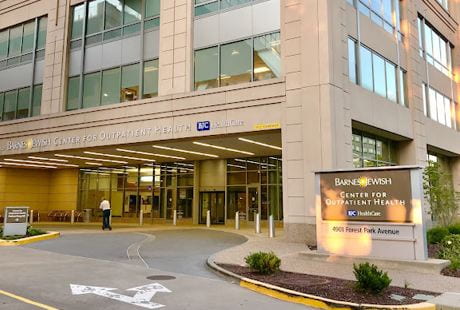
Barnes-Jewish Center for Outpatient Health
- Physical Address: 4901 Forest Park Ave, St. Louis, MO 63108, USA
The majority of residents provide continuity of care for their own patient panel at the Center for Outpatient Health (COH) in the Primary Care Medicine Clinic (PCMC) at Barnes-Jewish Hospital. Each resident is part of a team of 10-11 residents including members of each training year and has a designated attending leader. This team functions as a reservoir of knowledge and experience when intern year starts and continues throughout all three years. With the 4+2+2 scheduling, the team creates a system to help each other and work with team nurses on tasks during odd hour rotations such as night float or ICU. While the team attending is the foundation of the resident experience, there are many opportunities to learn from the practice styles of several outpatient attendings.
The PCMC serves many different populations from St. Louis, Missouri, and Illinois. To deliver this care there are excellent nurses, medical assistants, customer service representatives, social workers, diabetes educator nurse, nutritionists, and a team of pharmacists. There are 49 clinic rooms each fully equipped with a computer and stocked equipment drawer. There are four rooms with bariatric exam tables, and one room which is able to provide specialized foot care.
Each room is equipped with tools for ENT exams. Numerous point of care tests (A1c, UA) are present as well. For our robust telehealth program there are five iPads dedicated to the clinic, and all residents are provided smartphones with telehealth capabilities. Many in office procedures are performed such as joint injections, aspirations, incision and drainage, and simple laceration repairs.
The first patient appointments begin at approximately 8:00am with the noon hour off to attend educational conferences. Afternoon clinic starts at 1:00pm. There is progression of responsibility and number of patients seen with each year of training. In a clinic block, residents have 5-6 half- days of direct patient care each week. There is also protected time for an innovative ambulatory didactics experience integrated as a 36-month curriculum. Didactics occur one half-day for
PGY-1s and one half-day for PGY-2s and PGY-3s.
Each team in the Primary Care Medicine Clinic is responsible for developing a quality improvement project utilizing the Model for Improvement framework. Projects are initiated and led by the second-year residents with faculty mentorship. Residents conduct a needs assessment, craft a SMART aim, identify measures, implement change ideas, and collect data. Teams are expected to maintain an active project charter and provide monthly updates on their progress.
While continuity clinic is the bedrock of the outpatient experience, there are also many subspecialty experiences readily available. Approximately 2-3 clinic blocks each year are sub- specialty focused. There are approximately 17 different options including Cardiology, BMT, Gastroenterology, Radiology, Dermatology, and Sexual Health. These offer exposure to potential career opportunities and add to the care delivered to a resident’s patient panel by expanding breadth of knowledge and clinical experiences.
The outpatient experience and training at Washington University in St. Louis is robust and prepares residents with knowledge and skills needed in any career whether it is primary care, subspecialty training, or hospital medicine.